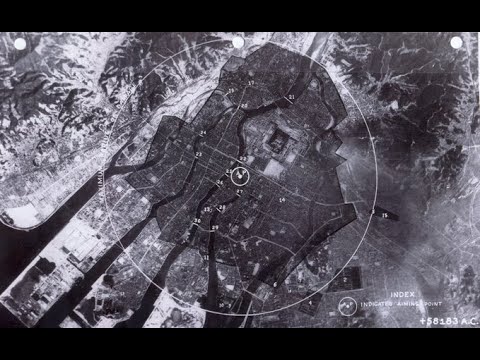"The atom bombs didn't even really do as much damage as our non stop fire bombing campaigns did."
"The bombs had no affect. By the time we dropped the atom bombs we had already fire bombed 90% of the cities to dust."
:cringe:
fyi the first hour of this video is about how terror bombing is fucked and completely militarily useless


not just "Bushido" but "Kokutai", which is something that exists within a spiritual/ideological realm & typified the fascist turn in the 1920s & 1930s
https://pbs.twimg.com/media/EqSlLGZXEAIMPb-?format=jpg&name=medium
Not to doubt you too much, but every time I see someone post something like this I search the term in Japanese to make sure it isn't just some weird propaganda bullshit. A lot of the time it seems to be weird propaganda bullshit, and it's actually pretty hard to find anything online in Japanese using the word 国家体制 (something like "the national order"? It seems deliberately meaningless, and 国体 today is just an abbreviation of "national athletics meet").
At first all I found was some bizarre fascist screed on what looks like some weirdo's Geocities page, and there really aren't very many hits at all, but this one does seem to be a Thing. Here's a book on Amazon.co.jp called "Japanese Fascism" that uses the word in the subtitle.
Actually my Japanese isn't good enough to tell if that book is pro- or anti-fascism. The tagline is "In this time of coronavirus, is fascism making a recurrence? A in-depth look at the experience of WWII fascism is indispensable", but written in such a weird roundabout way that I literally can't tell if the author thinks fascism coming back is good or bad. The first chapter is something like "Previous Marxist Study of Japanese Fascism", and the last chapter is "Fascist Order and Authoritarian Order", as if to draw a distinction between them.
Thanks for responding! I don't blame you for wanting to know more here, but Japanese fascism & ultranationalism & ethnocentrism are well-documented features of the military expansionist turn during the early 1900s & mid-century period.
https://pbs.twimg.com/media/ErussYxXEAA5UOC?format=jpg&name=medium
The industrial and modernization period in Japan were marked by heavy German & Western European influence, but this did not automatically "socially revolutionize" the archaic & monarchic/theocratic tendencies of Japanese civil religion. "Kokutai" is to be understood in the context of "Yamato-damashii" & Wakon-yōsai. These things typify & give "spiritual" ballast to that ideologically ultranationalist turn that quickly developed and rapidly accumulated wealth & power & authority after 1920s in Japan
https://pbs.twimg.com/media/Ej2uR7bXsAEuvab?format=png&name=medium
"Mikadoism", that is worship of the emperor in this context, was merely hypercharged & honed to advanced industrial precision & racial supremacy in this period
https://pbs.twimg.com/media/Erur9QaW4AIozUS?format=png&name=small
Japanese "National Socialism" as it was called for a time was very much a fascist tendency built on influences from Italy & Germany and elsewhere, as well as a hardened racial supremacist outlook that centered around worship of the "Emperor" as the nexus of all national character. No different in outcome than "Fuhrerprinzip", except the "principle" I suppose is more well-established& less "novel", but just as irrationally fixated on "palingenetic" spirit. In this way it's more like "Caesarism"
https://pbs.twimg.com/media/EruuZikXcAIHnNb?format=jpg&name=large
Shinto itself is often divided into three different broad "sub-categories", one of them being "Kokutai" or "state" shinto. Kokutai in this context is the distilling of allegiance to the Emperor & his mandate, but also an all-pervasive yielding to the national "character"
https://pbs.twimg.com/media/ErurncGXUAIXrFW?format=jpg&name=medium
https://pbs.twimg.com/media/ErutzpiWMAATfDd?format=png&name=medium
If these spurious notions about a natural harmonious and immortal "Japanese national spirit" can be preserved & even transmitted since that fascist period, as evinced by Yukio Mishima and others since, then we have to be on guard for this thing to rear its ugly head again
"Kokutai" is quite a unique facet of Japanese "worldview" and political history, though not totally unprecedented or without parallel. Nevertheless, your claim on "national athletics" is also somewhat in the news recently with regard to Japanese ethnonationalism & abusiveness in national sports training
https://www.cnn.com/2020/07/20/sport/japan-child-athletes-abuse-hurman-rights-watch-report-spt-intl/index.html
It turns out the Japanese wiki article is pretty in-depth, and obviously lacks the weird Orientalism.
Sorry, sometimes I'm just too used to seeing "the ancient Japanese practice of [extremely common mundane word]."
https://ja.wikipedia.org/wiki/%E5%A4%A9%E7%9A%87%E5%88%B6%E3%83%95%E3%82%A1%E3%82%B7%E3%82%BA%E3%83%A0
that one covers it somewhat in detail too
also, fetishizing or making apologies for or going out of one's way to "Otherize" & "exoticize" the material/historical and objective realities in these places is another form of "Orientalism". I am only looking at primary sources from the time, not just historical revisionism & pro-Japanese perspectives that need to whitewash & "contextualize" this brutal history
Straining to find "idiosyncrasies" or "peculiarities" and deferring to "nuance" or something when the historical facts point clearly at an irrational ultranationalist thread running through these Anti-Comintern Pact nations is all deflection.
the sources I provided are largely translations of quotes made by Japanese scholars & business leaders & all squarely from the pre-war period
Not sure if you looked at the information I provided, but any of the sources you have questions about I can give more about them.